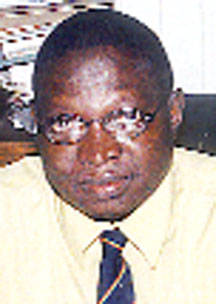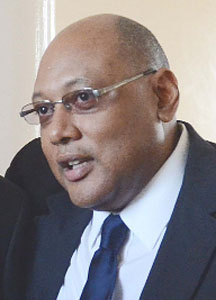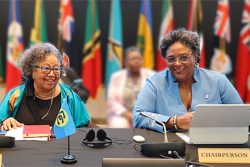Clerk of the National Assembly, Sherlock Isaacs yesterday refused to convene a sitting of Parliament on November 6, 2014 as he had been requested to do, prompting Speaker Raphael Trotman to declare a constitutional crisis and urging all stakeholders to work at resolving the matter.
The opposition has been pressing for the convening of Parliament but since the end of the recess, questions have arisen as to who had the power to call a sitting. Isaacs had advised Trotman that such power did not reside in the speakership. However, Trotman after consulting with former speakers had arrived at the conclusion that sittings could be held based on the Standing Orders and he asked Isaacs to convene one. This has now been nixed and focus will now shift to government Chief Whip Gail Teixeira who has been accused by Opposition Chief Whip Amna Ally of dilly-dallying with the date.
Trotman in a release yesterday stated that “I was formally notified by the Clerk of the National Assembly that after consideration, my request for the National Assembly to be convened on Thursday, November 6, 2014, cannot be given effect to by him because he is of the view that the Speaker lacks the authority to convene sittings of National Assembly under Standing Order 8 (1) and (2).”

Trotman said that he will write the Clerk to “register my disagreement with his interpretation of the Standing Orders and his consequent position adopted”.
Trotman stated that “the effect of the Clerk’s decision not to convene the sitting has the effect of crippling the ability of the Members of Parliament to meet” continuing that “this in itself brings the Constitution into derision and disregard and cannot be what the framers of our Constitution intended.”
The Speaker said that the roles of both the Speaker and Clerk are regulated by the Constitution and the Standing Orders. He said that “The Speaker performs the role of “Presiding Officer” once the Assembly is convened; whilst the function of convening the National Assembly remains the sole preserve of the Clerk.”
Trotman wrote that “As constitutional officers, both are expected to work symbiotically for the National Assembly to be able to properly discharge its constitutional roles and functions. It is the duty of the Clerk to convene the sitting by making all arrangements including, summoning and ensuring the attendance of Members, and the preparation and circulation of the Order Paper.”
He said that the “unfortunate position arrived at” by Isaacs is due to a “very narrow interpretation of the Standing Orders and of the prevailing circumstances whereby the National Assembly entered into recess and has emerged from that recess, and a majority of Members desire to meet.”
During the Parliamen-tary recess, from August 10-Ovtober 10, Trotman had stated that he was not opposed to calling an emergency sitting of the House if the majority of the members had made the request.
On Tuesday, Isaacs told Stabroek News that he was awaiting feedback from Clerks across the Carib-bean on their interpretations of the Standing Orders and if his initial interpretation was indeed accurate or not. He had noted that he was still of the view that his initial interpretation was accurate although Trinidad and Tobago’s Clerk of the House and consultant to the drafting of Guyana’s Standing Orders, Jacqui Sampson-Meiguel was of the view that the Speaker’s request should be obliged and the government could take the matter to the courts.
Jamaica’s Clerk to the House of Parliament Heather Cooke, who was also contacted by Isaacs, wrote him earlier in the day and stated that based on readings of Jamaica’s, Guyana’s and the United Kingdom’s Standing Orders, the Speaker could only adjust a date for the House to meet but could not set one.

On Monday, Trotman requested that Isaacs make preparations for the National Assembly to meet next Thursday, after concluding that no direction from the government was needed. Trotman wrote that after consultations with Isaacs and former Speakers Sase Narine and Ralph Ramkarran, he had come to the conclusion that the Standing Orders have already settled the issue of when the National Assembly is to meet when a date is not fixed.
At the last sitting before the parliamentary recess, the Assembly was adjourned to “a date to be fixed” and Isaacs has held that Standing Order 8(2) does not authorise the Speaker to call a sitting where there is no fixed date for the next sitting.
Trotman said he was in complete agreement with Isaacs as it relates to Standing Order 8 (2) but noted that it “cannot mean that the National Assembly cannot be convened unless by agreement; especially where such agreement appears elusive to even impossible.”
The stalemate between the Speaker and the Clerk brings the issue full circle with the government in the positon to set a date. Stabroek News has reached out to government Chief Whip, Teixeira multiple times over the course of the past week to no avail. Observers have noted that the government appears to be stalling the sitting of the House because of the looming Alliance For Change no-confidence motion that is yet to be tabled.
Head of the Presidential Secretariat, Dr Roger Luncheon in his weekly post cabinet press briefing yesterday said that the government will be making a decision by the end of the week as to when a date will be set for the House to sit.
Earlier in the day and prior to the Speaker’s decision, General Secretary to A Partnership for National Unity, Joseph Harmon disclosed that the party was respecting the decisions made by the Speaker. Opposition Leader David Granger had previously stated that while he received correspondence from the AFC requesting that his group lobby support tot have the Speaker set a date it was “not in our hands.”
Pre-empting possible media queries, President Donald Ramotar yesterday said that Parliament will meet in the near future but didn’t disclose a date either. He was at the time addressing an audience at the opening of the National Toshaos Council Meeting at the International Con-ference Centre, Liliendaal. He stated that in years passed the House had reconvened in November and that the sitting of the House rarely happened right after the recess, however critics have noted that given the current political climate due to the no-confidence motion the government is in no rush to have the parliament convene.
In his Sunday Stabroek column this week, former two-term speaker, Ralph Ramkarran said that it has been wholly wrong and ultra vires the power of the current and past Speakers to convene the National Assembly at the request of the Government, in clear violation of Standing Order 8(1). “If the parties wish to have the possibility of adjourning the National Assembly to an unspecified date, and for it to be convened at the request of the Government or the Chief Whips or someone else, then the Standing Order should be amended and such a rule included. It was wholly wrong for the stakeholders to manufacture a practice, elaborate examples of which the Clerk set out in his letter, which violated Standing Order 8(1),” he wrote.
While Ramkarran has been basing his arguments on Standing Order 8 (1), Isaacs has relied on Standing Order 8 (2) which states that “If, during an adjournment of the Assembly, it is represented to the Speaker by the Government, or the Speaker is of the opinion, that the public interest requires that the Assembly should meet on a day earlier than that to which it stands adjourned, the Speaker may give notice accordingly and the Assembly shall meet at the time stated in such notice.”
The Clerk had said that it was not possible in his view for the Speaker to set a date and that the Speaker only had the authority to adjust a date that had already been set should the public interest arise. When it went into recess, the Assembly was adjourned without a date for its reconvening fixed. Isaacs also cited two precedents which he said have backed up his position.
However, Ramkarran in his column said that ‘Practice and precedents’ upon which the Clerk seeks to rely “do not and cannot supersede or violate a specific rule, such as Standing Order 8(1), now that it has been correctly interpreted, or give power to the Speaker to fix a date where none exists, as I have argued and as the Clerk has agreed.”
“It does not matter for how long a practice or precedent has been in force. It was wrong when it started. It is wrong now,” he declared.









